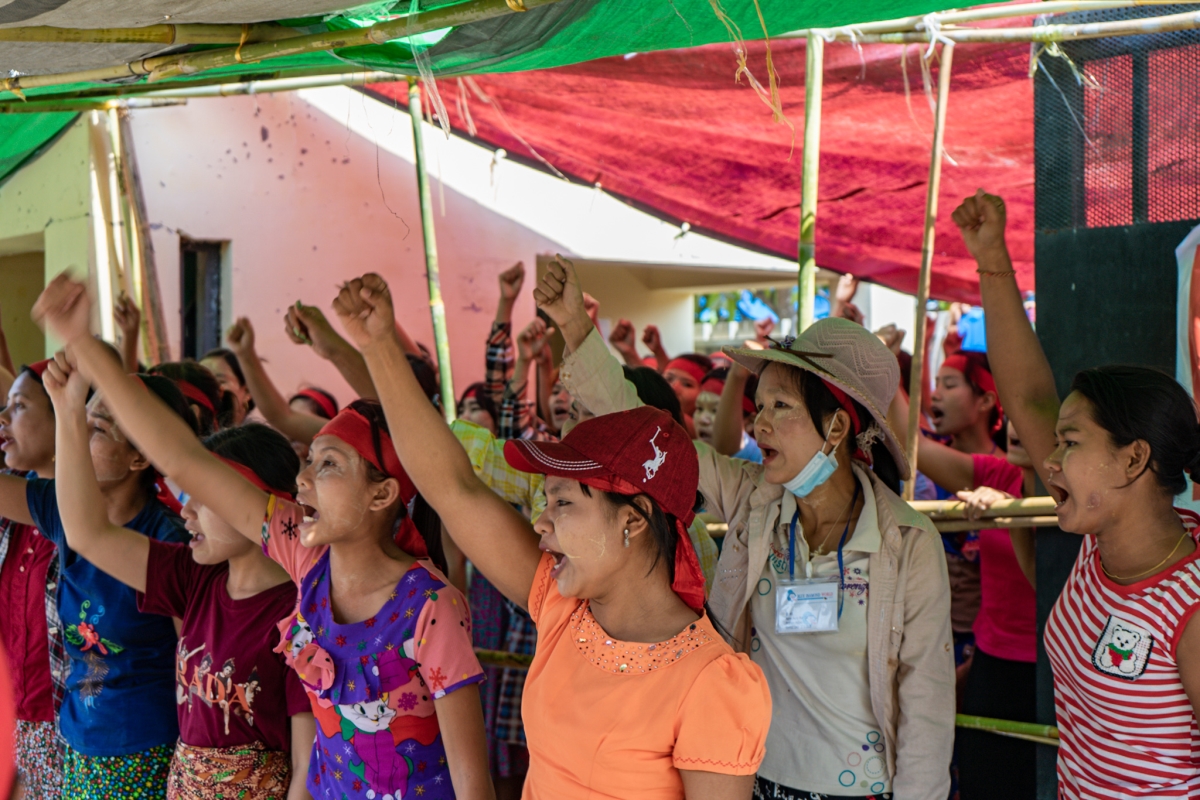
Zar Zar Tun, 31, made bags in a factory and Aung Zaw Oo, 37, welded on construction sites. It was just enough to care for their two-year-old daughter and Zar Zar Tun’s mother in Yangon until COVID-19 broke out in Myanmar.
The country has so far been relatively unscathed in the fight against the virus, but, other than the families of its six coronavirus deaths, hundreds of thousands of workers whose livelihoods have been thrown in disarray have felt the cost most acutely.
For Zar Zar Tun, the fear of returning to Blue Diamond World factory in No 1 Industrial Zone, Dagon Seikkan Township amid the pandemic pushed her and hundreds of others to protest for paid leave in April—a month that included national Thingyan holidays and government-ordered business closures.
Her efforts saw her arrested, along with five other basic union leaders, on May 4 under section 118 of the Penal Code for violating a night-time curfew by camping overnight at the factory. She was released from Insein Prison on July 30, though she is currently being charged for wrongful restraint under section 341 of the code for blocking the factory entrance.
While his wife was behind bars, Aung Zaw Oo took time off to raise his daughter but his employers have not invited him back after his continued absence.
“This pandemic is making it hard for me to find work,” Aung Zaw Oo told Myanmar Mix. “And I have felt devastated and lost over my wife, although it was much worse for her. She has never been jailed before, she was crying whenever we went to see her.”
A cloud is hanging over the family’s reunion: not only is Zar Zar Tun likely to be imprisoned again soon, but also the parents have not found any work, spiralling Aung Zaw Oo into bouts of depression.
Scores of unionised workers have been arrested for protesting; many more have been let go anyway or returned from work abroad to bleak employment opportunities. The crisis has plunged Myanmar’s economy to its worst state for three years, according to a July Myanmar Marketing Research and Development Business Sentiment survey, which found that three-fifths of businesses have no confidence that the economic landscape would recover in the next three months; 90 percent of the respondents also said their businesses were performing poorly.
Clinical psychologists worldwide are warning that stressors brought by the pandemic—among them job losses and general uncertainty—can lead to stress, anxiety, depression and other mental health challenges. Evidence is emerging that the economic fallout is disproportionately on young workers, low-income families and women, according to the UK-based Institute for Fiscal Studies.
Wai Zin Oo, 27, a union rep at glove factory Mayfair Myanmar, described being “hopeless and helpless” after he was sacked for protesting for paid leave during the lockdown.
“Every factory I go to for an interview rejects me because they fear I may rebel against them in the future, some use the pandemic as an excuse,” he said. “I go home, disheartened, worrying I may not be able to provide for my family in the future. My colleagues are scared that they might not be able to get a job ever again. Some of them call me, all crying, and try to tell me their problems.”
Seeking help
Kyaw Zin, 23, founded free counselling helpline Call Me Today in June, 2018. “Before the pandemic, only about 200 people contacted us in one and a half years,” Kyaw Zin told Myanmar Mix. “However, from when the pandemic started in March and until the end of June, 140 people reached out to us.”
Many of the callers have been worried about their jobs and financial security, said Kyaw Zin, who added, “Some people were cooped up for so long inside their house, they started having negative thoughts. So we had to listen to their concerns to ensure they didn’t do anything bad.”
With support from Swiss non-profit international development group Helvetas Myanmar, Call Me Today launched helpline Aye Chan Thaw Eain (A Peaceful Household) in April specifically for one of Yangon’s poorest townships, Shwepyithar, where thousands of workers have lost their jobs because of the pandemic.
“People who still have their jobs are upset about having their pay cut,” he said. “Some of them have no other line of work to do, so they’re basically stuck in this cycle.”
Eri Taniguchi, a gender-based violence programme specialist for the United Nations Population Fund Activities, said that frontline workers shared their growing anxieties during meetings with the UNFPA-affiliated Mental Health and Psychosocial Support Working Group.
“They could not help checking the news more than necessary to see how many new cases were confirmed,” she told Myanmar Mix in an email. “More and more people have started to realize that they have some kind of negative feelings caused by the pandemic, such as feeling worried and anxious.”
For every 100,000 people in Myanmar, there are only 0.4 trained psychiatrists and 0.3 psychiatric nurses—and only 16 percent of these psychiatrists and nurses work in outpatient settings, according to the World Health Organisation (WHO) in 2017.
WHO data shows most of Myanmar’s mental health services are provided primarily through two psychiatric hospitals, 22 psychiatric wards of general hospitals, and 36 outpatient mental health facilities for adults and two for children.
Mental health expenditures accounted for just 0.3 percent of the country’s health spending in 2006, according to a WHO-Assessment Instrument for Mental Health Systems report. In 2011, WHO reported that primary care physicians can prescribe medication and access treatment manuals, but a majority had not received any training within the five years previous.
Years of state neglect towards mental health services have not stopped people seeking help during the current crisis.
Khin Yadana Soe, 34, co-founder and resident psychiatrist of mental health service Metanoia in Hlaing township, said the centre is receiving more patients and inquiries—many showing signs of anxiety and depression.
“There are more psychological problems as time goes on, especially in a long period of time like now,” she said. “Not just financial problems, many of these people develop anxiety due to multiple factors like staying at home for a long time.”
But if there is one positive to take from the situation, the experts interviewed for this article agreed that the pandemic would at least boost awareness of mental health in Myanmar—and perhaps it would finally pave the way for people to take a long-dismissed topic more seriously.

